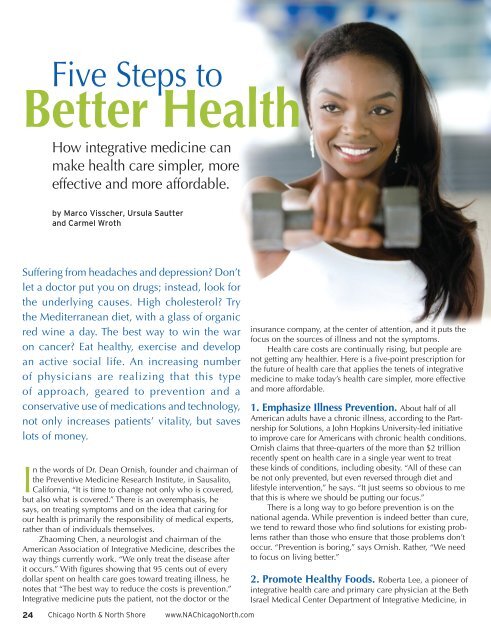Health & Well-Being 5 - Natural Awakenings
Health & Well-Being 5 - Natural Awakenings
Health & Well-Being 5 - Natural Awakenings
Create successful ePaper yourself
Turn your PDF publications into a flip-book with our unique Google optimized e-Paper software.
Five Steps to<br />
Better <strong>Health</strong><br />
How integrative medicine can<br />
make health care simpler, more<br />
effective and more affordable.<br />
by Marco Visscher, Ursula Sautter<br />
and Carmel Wroth<br />
Suffering from headaches and depression? Don’t<br />
let a doctor put you on drugs; instead, look for<br />
the underlying causes. High cholesterol? Try<br />
the Mediterranean diet, with a glass of organic<br />
red wine a day. The best way to win the war<br />
on cancer? Eat healthy, exercise and develop<br />
an active social life. An increasing number<br />
of physicians are realizing that this type<br />
of approach, geared to prevention and a<br />
conservative use of medications and technology,<br />
not only increases patients’ vitality, but saves<br />
lots of money.<br />
In the words of Dr. Dean Ornish, founder and chairman of<br />
the Preventive Medicine Research Institute, in Sausalito,<br />
California, “It is time to change not only who is covered,<br />
but also what is covered.” There is an overemphasis, he<br />
says, on treating symptoms and on the idea that caring for<br />
our health is primarily the responsibility of medical experts,<br />
rather than of individuals themselves.<br />
Zhaoming Chen, a neurologist and chairman of the<br />
American Association of Integrative Medicine, describes the<br />
way things currently work. “We only treat the disease after<br />
it occurs.” With figures showing that 95 cents out of every<br />
dollar spent on health care goes toward treating illness, he<br />
notes that “The best way to reduce the costs is prevention.”<br />
Integrative medicine puts the patient, not the doctor or the<br />
24 Chicago North & North Shore www.NAChicagoNorth.com<br />
insurance company, at the center of attention, and it puts the<br />
focus on the sources of illness and not the symptoms.<br />
<strong>Health</strong> care costs are continually rising, but people are<br />
not getting any healthier. Here is a five-point prescription for<br />
the future of health care that applies the tenets of integrative<br />
medicine to make today’s health care simpler, more effective<br />
and more affordable.<br />
1. Emphasize Illness Prevention. About half of all<br />
American adults have a chronic illness, according to the Partnership<br />
for Solutions, a John Hopkins University-led initiative<br />
to improve care for Americans with chronic health conditions.<br />
Ornish claims that three-quarters of the more than $2 trillion<br />
recently spent on health care in a single year went to treat<br />
these kinds of conditions, including obesity. “All of these can<br />
be not only prevented, but even reversed through diet and<br />
lifestyle intervention,” he says. “It just seems so obvious to me<br />
that this is where we should be putting our focus.”<br />
There is a long way to go before prevention is on the<br />
national agenda. While prevention is indeed better than cure,<br />
we tend to reward those who find solutions for existing problems<br />
rather than those who ensure that those problems don’t<br />
occur. “Prevention is boring,” says Ornish. Rather, “We need<br />
to focus on living better.”<br />
2. Promote <strong>Health</strong>y Foods. Roberta Lee, a pioneer of<br />
integrative health care and primary care physician at the Beth<br />
Israel Medical Center Department of Integrative Medicine, in





